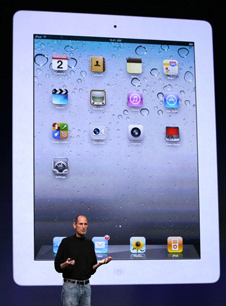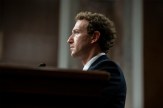3Qs: Jobs is back — What does it mean?

Although Apple co-founder and CEO Steve Jobs has been on medical leave since January — placing the company in the hands of chief operating officer Timothy Cook — Jobs was back on stage this week, rolling out the new iPad 2. Here, Daniel McCarthy, McKim-D’Amore Distinguished Professor of Global Management and Innovation in the College of Business Administration, discusses the computer giant and how high-level successions affect large corporations.
By all accounts, Tim Cook has filled in admirably as interim CEO during Jobs’s prior temporary leaves. So what do you make of the fact that it was Jobs introducing the new iPad 2 on Wednesday?
The excitement over the new iPad is a great opportunity for both Apple and Tim Cook, who is unquestionably in line to follow Jobs as Apple’s CEO. The company could have used this very positive moment as a platform to thrust Cook forward as the “future” for Apple, but it looks as if Jobs is holding the spotlight for himself, and possibly trying to provide confidence to shareholders that he will be back.
Do prominent executive-level successions affect the company in the eyes of the public, company investors and company employees?
Absolutely. CEO succession is critical to all stakeholders and Apple seems to be handling the present circumstances really well. Its products and services are too deeply entrenched in the lifestyles of millions of people to suffer setbacks in the short or mid-term. For instance, the number of iPhone and iPad applications downloaded from Apple’s App store will reach the 10 billion milestone in the very near future. The presence of Tim Cook is a real consolation to most stakeholders that the company will continue to move ahead without severe disruption, at least in those time frames. The stock market, for instance, reacted negatively upon the news of Steve Jobs’s impending absence, but rebounded immediately. [On March 2, 2011, the stock traded at a lofty $352 a share, with a target price on the part of many analysts exceeding $400]. The same optimism is likely in the marketplace.
What pressures do executives face when leading a high-profile company?
Consistently meeting high and demanding expectations of shareholders, such as earnings per share in the short term, as well as positioning the company for long-term growth. At the same time, such executives are also expected to build a strong executive team, prepare for succession, and often be a voice of the company to the general public. To accomplish all of these in a technologically based business, they are expected to understand the role of technology and how to use it to satisfy customer expectations and demands.
In Steve Jobs’s case, he seems to have done all of these things very well. Jobs is a charismatic leader and innovative visionary. It is clear that there is no way to replace him with the same kind of leader as he has been, any more than Microsoft was able to replace Bill Gates when he stepped down, because Steve Ballmer is a far different type of leader than Gates. And still, Microsoft has continued its momentum as a leading technologically based company. I would expect Apple to do the same, primarily since Steve Jobs has positioned the company for long-term success.





